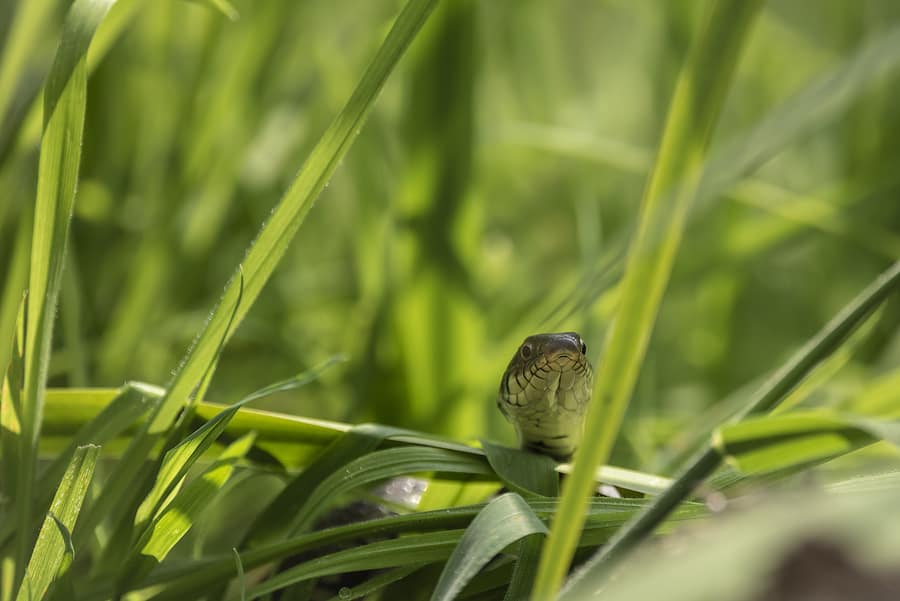READY TO GET STARTED?
REQUEST A FREE ESTIMATE
Fill out the form below or call (888) 466-7849 for a free, no-obligation estimate.

While most snakes you encounter are harmless, many of us still don’t want to come across one in our yard or home. While our first instinct may be to run, most snakes are actually beneficial to have around – they help keep other pest populations under control (rodents, frogs, etc.).
Snakes will come into your yard in search of 2 things: shelter and food. Snakes will seek out shelter to have a place to rest, breed, and hunt. Common places snakes are found include overgrown grass, dense brush or shrubs, leaf piles, rock piles, compost, or areas with moisture like underneath bird baths, around leaky faucets and hoses, or near ponds or swimming pools. Snakes will also come looking for food. Snakes love to eat rodents, moles, frogs, fish, snails/slugs, and other small insects.
If you prefer not to encounter snakes around your home, here are 7 natural ways you can keep snakes away.
Snakes will come around looking for food so if your home provides them with that, you’ll be more likely to encounter them. Getting rid of these food sources will encourage snakes to move along in search of something to eat. Make sure common pests that snakes like to eat are kept under control. Scheduling routine pest control can help with this.
Snakes are also attracted to areas with a lot of moisture. Eliminate standing water in your yard where possible. Repair leaky faucets and replace leaky hoses. Keep pools, ponds, and other water features maintained. If using sprinklers, make sure they are running in the morning so the water has time to soak in or evaporate before it gets dark. This helps keep soil in your yard from being too wet.
Snakes will look for places around your home to hide so they can breed and rest. Get rid of coiled hoses or use hose boxes. Avoid using rock piles in your landscaping, if possible. Store firewood in boxes or elevate it when possible. Keep your grass mowed and dense brush cleared out. Seal off or add fencing to any open areas under sheds or other buildings. If you are using snake-proof fencing, make sure it is made of steel mesh or plastic sheeting, it is at least 3 feet high and 4 feet deep, it is flush with the ground, and it is angled outward.
Some plants are known to repel snakes. Try to incorporate these plants into your landscape design where possible. Common snake-repelling plants include marigolds, lemongrass, Mother-in-Law’s tongue, wormwood, onion, and garlic.
Gophers, moles, and voles dig burrows across your yard. Once they’ve been eliminated, these old gopher holes and burrows can remain on your property. Snakes will commonly use them for shelter as they provide a great place for them to hide, rest, and breed. Fill in any of these holes and burrows with dirt or gravel. This will help deter snakes from using them.
Snakes have a few natural predators that can help keep them away. Common snake predators include cats, raccoons, pigs, turkeys, guinea hens, and foxes. Keeping any of these animals around your home will help deter snakes from coming near. You can also buy fox urine and sprinkle it around your property to help deter snakes, as well.
There are several natural products that are known to repel snakes. These natural snake repellents can be used around the perimeter of your property, around pools, along the edges of ponds, and anywhere else you have noticed snake activity.
Despite our best efforts, snakes can still make their way into our yards and homes. If you have a problem with snakes, contact your local pest control company who specializes in snake removal who can help you properly identify the type of snake you have (venomous vs nonvenomous) and help safely and humanely remove it from your property.
How Do Cockroaches Get Into the House?
Identify and Prevent Brown Recluse in Your Tennessee Home